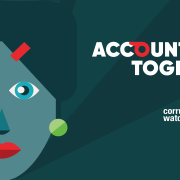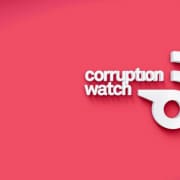|
Getting your Trinity Audio player ready...
|
Corruption Watch (CW) releases today its 12th annual corruption report, titled Changing the Landscape, just a few months ahead of one of the most critical turning points in the country’s post-democratic history.
Presented during an election year, this report bears stark witness to the path South Africa finds itself on after 30 years of democracy, and the reality of the multiple crises that threaten the fulfilment of the state’s electoral and constitutional mandate. Poor leadership and lack of accountability has eroded public trust and confidence in the state’s capacity to deliver on the promise of an equal and just society, as impunity for those implicated in wrongdoing continues. Along with these challenges, the sheer scale of corruption and mismanagement has contributed to rising levels of poverty, inequality, unemployment, crime, and deteriorating infrastructure, utilities, and services.
“Corruption Watch remains at the centre of the fight against corruption, determined to hold those in power accountable because we understand that this hard-won democracy must be defended by all South Africans who care about the future of their country,” states CW board chairperson Themba Maseko in the report.
Karam Singh, CW executive director, echoes the need to preserve our democracy, cautioning that “…we cannot afford to lose any more ground in the fight against corruption and the realisation of human rights. It is within our power to change the current landscape if we all work together, starting with a strong turnout at the polls in May.”
This year’s theme of Changing the Landscape can be interpreted both literally and metaphorically, as CW has both goals in mind. The organisation’s work in the Land and Corruption in Africa project aims to physically change the landscape for those farm workers who were the subject of CW’s research into Farm Worker Equity Schemes, primarily in the Western Cape, who have been cheated and deprived of the benefits they were promised.
Similarly, CW’s work to improve the environment and to seek ways to provide better support for whistle-blowers remained a focal point during 2023, and efforts continue within CW and in collaboration with other stakeholders to improve the environment, making it safer for people to expose corruption and wrongdoing.
CW 2023 data
More than 12 years since its inception, CW has received over 46 900 complaints of alleged corruption, which have provided valuable insight and have helped to shape many of the organisation’s interventions and activities.
This is an average of 11 reports per day from every part of South Africa, from ordinary people brave enough to expose corruption and the abuse of power.
In 2023 the organisation received 2 110 reports, and as in the previous year, largely focused on wrongdoing and malfeasance in the mining sector (38%). Most of these reports resulted from the CW team’s specific interventions in mining communities experiencing the brunt of the effects of corruption.
Similarly, the second highest number of complaints received was in the policing sector (23%), followed by business at 16%, basic education at 12%, and state-owned entities at 11%. These figures speak to government’s failure to provide basic services and rights such as efficient policing, safety and security, employment, and education.
The predominant types of corruption in 2023 are maladministration, a major area of concern counting for 34% of reports, followed by fraud (21%), employment irregularities (16%), bribery or extortion (15%), and procurement irregularities (13%).
The cities of Johannesburg, Tshwane, and Cape Town collectively account for 71% of corruption incidents out of the five municipalities with the highest number of corruption reports. The other two are Dannhauser and Matjhabeng at 15% and 14% respectively.
The provincial spread has Gauteng at the top with 37% of complaints, followed by KwaZulu-Natal with 19%, Free State with 10%, and the Western Cape with 9%. These provinces which collectively represent 75% of reports are all considered to be hotspots for monitoring corruption.
Highlights and challenges in 2023
CW’s work in 2023 was multi-faceted, with interventions across sectors and channels to advocate for greater awareness of people’s rights, improvements to legislation and policy, and participation in processes and on platforms to address loopholes and system failures that allow corruption to thrive.
Aside from the ground-breaking work on corruption in the land sector, the CW team kept its attention on several other critical areas with the potential to have far-reaching consequences in relation to transparency and accountability. These include the monitoring of significant leadership appointment processes, submissions to key legislative amendments, and scrutiny of corruption in the corporate sector.
Other long-standing projects and focus areas received attention in 2023, such as corruption in the policing sector and the procurement space, as well as engagement with mining-affected communities.
The year 2023 also proved to be a fruitful one for the CW team in terms of regional and international collaboration and engagement including hosting the Africa Regional Meeting of Transparency International. These interactions were instrumental in assisting the organisation to locate its own work in the context of African and global initiatives to combat corruption.
It is clear from the scope of work undertaken by the CW team that the fight against corruption is nowhere near at its end. The requirement and opportunity to change the landscape for all who live in South Africa is right now, at this moment in the country’s history.
“Together we can change the landscape – many of the blueprints are already on the table including the National Anti-Corruption Strategy and Zondo Commission recommendations. The future of our democratic health depends on reversing the decline and fulfilling the promise of the Constitution and the liberation struggle,” concludes Singh.
Download Corruption Watch’s 2023 annual report.
For media enquiries contact:
Oteng Makgotlwe
Cell: 076 473 8336 E-mail: OtengM@corruptionwatch.org.za








